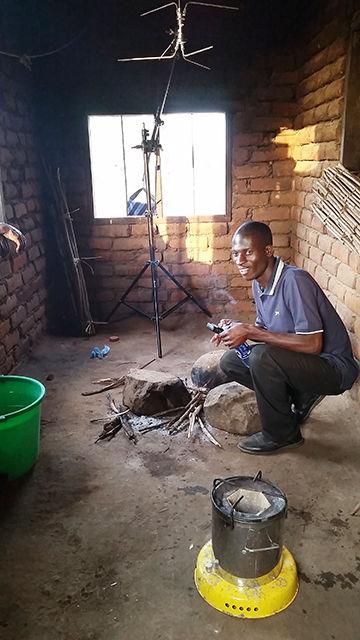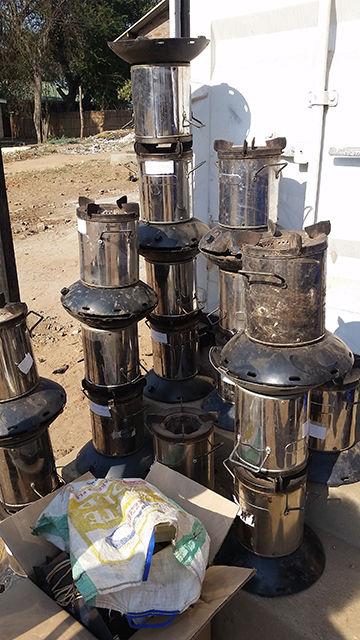Many parts of the world do not have access to stable electric or gas stoves to cook, instead relying on wood-burning stoves. The wood-burning stoves can cause respiratory diseases from soot produced as well as ecological damages. An NC State research team traveled to Malawi to study how harmful these wood-burning stoves were.
Andrew Grieshop is an assistant professor in the Department of Civil, Construction and Environment Engineering. He set out to Malawi, along with his graduate student, Roshan Wathore, to conduct a one-month experiment on how the wood-burning stoves were affecting the people of Malawi.
“I was motivated to join this project because it was in line with my current research in India,” Wathore said. “Also, who could pass the opportunity to live and experience Africa for a month?”
The project was funded by the Global Alliance for Clean Cookstove. The organization is a public-private partnership hosted by the UN Foundation with a goal to improve lives, empower women and protect the local environment by providing households with cleaner stoves.
Although replacing stoves may seem like an odd approach to improving the lives of women, it can have a surprisingly huge impact. In many countries that use wood-burning stoves, women spend hours chopping wood to use for fuel. By replacing these wood-burning stoves with clean gasifier stoves, women are freed from their everyday wood-chopping chores, freeing up that time to be spent getting an education or finding opportunities to empower them. In addition, the cleaner gasifier stoves free women from the risk of getting harmful respiratory diseases.
“The wood-burning stoves produce black particles called soot,” Grieshop said. “These particles build up over time in the respiratory system, causing lung cancers and even strokes.”
Also, the wood-burning stoves destroy local environments. In many developing nations, the wood-burning stoves are the leading cause in local deforestation, which is resulting from chopping wood for fuel. With an estimated 3 billion people still using the wood-burning stoves, the soot produced has a significant effect on global warming.
In September of 2015, Grieshop left Raleigh with Wathore, for Chikwawa, Malawi, the first town to conduct their project. After a 45-minute drive from the airport in Lilongwe, the capital of Malawi, they arrived at Chikwawa. There, they saw the damage caused by locals’ use of wood-burning stoves, which left miles of a once lush tropical forest, barren with just stumps reminding people of what used to be there before.
“Malawi is one of the poorest countries in the world with high rates of deforestation as 90 percent of the population rely on woods from the local forest for fuels,” Wathore said. “Only 5 percent of the population has access to electricity.”
In Chikwawa, Grieshop contacted field staffs from the Liverpool School of Tropical Medicine, who helped him with translation and building rapport with locals. The field staff then took Grieshop to village chief to get a permission to conduct his research.
“The locals greeted me with so much hospitality,” Grieshop said. “I remember locals greeting me with their welcome dance in the first night along with a big feast.”
With the village chief’s approval, Grieshop quickly worked to collect the needed data with the help of Roshan. They use an equipment that can pick up soot particles with its filters to collect how much the stoves were producing them. The stoves were producing so much soot that Grieshop needed to do minor adjustments to the filters so they could last throughout the study. Although the equipment was undamaged on their way to Malawi, the team encountered setbacks with the gasifier stoves when utilized in the locals’ homes.
“The problem with the gasifier stoves were that they were only tested for water boiling test as that was the standard lab test,” Grieshop said. “Out in the field, people were using them for not just boiling waters, but cooking and heating too.”
After some quick in-the-field fixes, the stoves were able to handle the local cooking methods. After the month-long project, Grieshop and Roshan exchanged gifts with the locals. Grieshop gave villagers solar-powered lanterns. In return, the villagers gave Grieshop a Chitetezo Mbaula, a traditional Malawi adobe stove, now resting in Grieshop’s office in Mann Hall.
Andrew Grieshop, an assistant professor in environment engineering, provided households of a village in Malawi with gas powered cook stoves to replace the wood fueled stoves.









